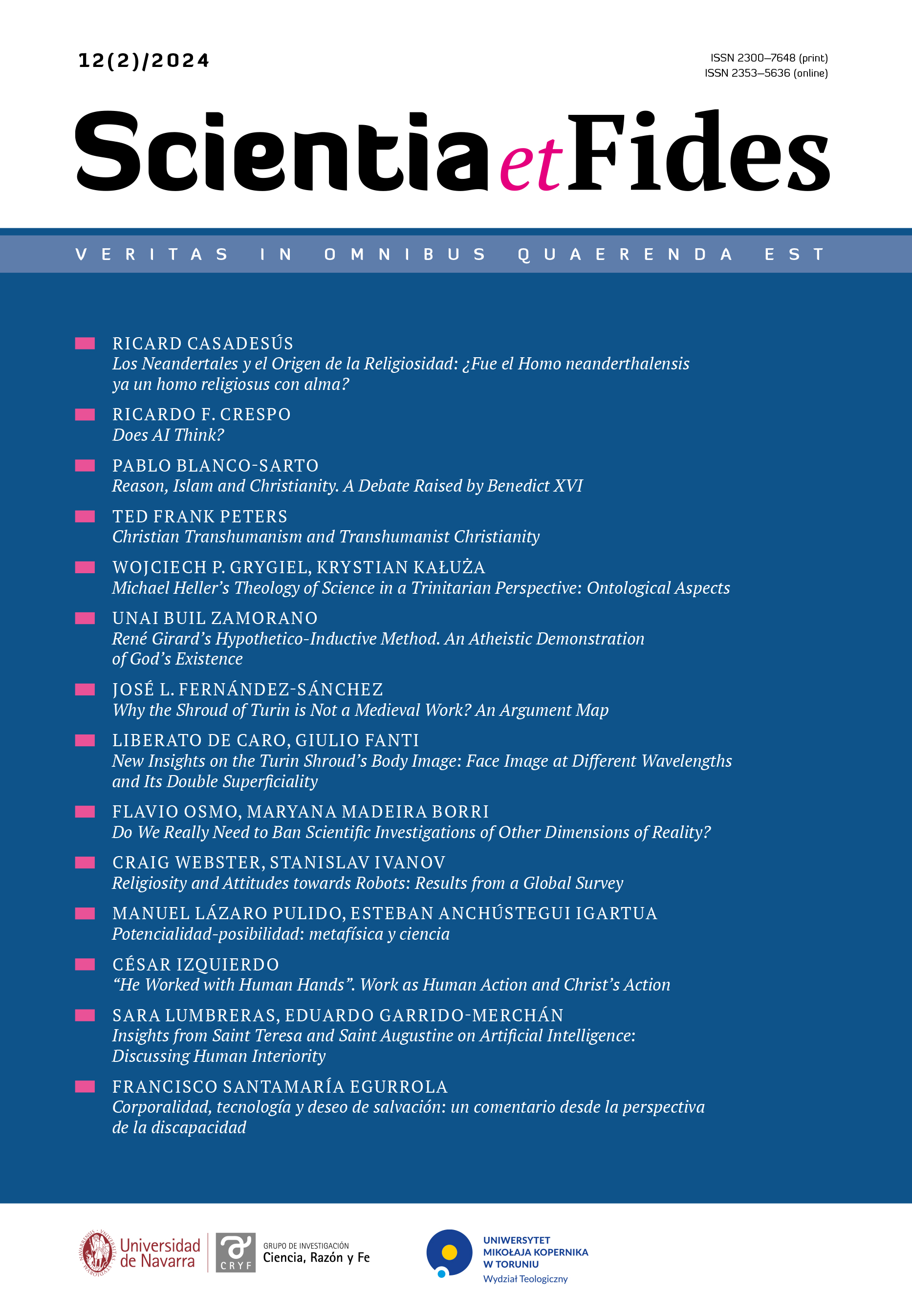Corporeality, Technology and Desire for Salvation: A Comment from the Perspective of Disability
DOI:
https://doi.org/10.12775/SetF.2024.026Keywords
Alasdair MacIntyre, virtues, teleology, happinessAbstract
In disability studies, discomfort arose at the time due to the scant consideration that the corporeal condition was receiving in the so-called "social model of disability". The study recently published by Jorge Martín Montoya Camacho and José Manuel Giménez Amaya under the title “Corporality, technology and desire for salvation. Notes for an anthropology of vulnerability” offers an interesting framework for disability studies, as it allows us to understand disability within a broad proposal of philosophical anthropology. Indeed, the study we are commenting on, making use of Aristotelian philosophy, adequately articulates our bodily and social dimensions with the ends of human life
References
Hughes, Bill., & Paterson, Kevin. 2008. “El modelo social de discapacidad y la desaparición del cuerpo: hacia una sociología del impedimento.” En Superar las barreras de la discapacidad: 18 años de “Disability and society”, coord. por Len Barton, 107–23. Madrid: Ed Morata.
Lombo, José Ángel y Giménez Amaya, José Manuel. 2016, Biología y racionalidad. El carácter distintivo del cuerpo humano, Pamplona: Eunsa.
Montoya Camacho, Jorge Martín y Giménez Amaya, José Manuel. 2024. Corporalidad, tecnología y deseo de salvación. Apuntes para una antropología de la vulnerabilidad. Madrid: Dyckinson S.L.
MacIntyre, Alasdair. 2001. Animales racionales y dependientes. Por qué los seres humanos necesitamos las virtudes, Barcelona: Paidós.
Palacios, Agustina y Romañach, Javier. 2006. El modelo de la diversidad: la bioética y los derechos humanos como herramientas para alcanzar la plena dignidad en la diversidad funcional. Madrid: Diversitas– AIES.
Romañach, Javier y Lobato, Manuel. 2005. “Diversidad Funcional, nuevo término para la lucha por la dignidad en la diversidad del ser humano.” website Foro de Vida independiente, 26 de julio de 2009 http://forovidaindependiente.org/diversidad-funcional-nuevo-termino-para-la-lucha-por-la-dignidad-en-la-diversidad-del-ser-humano/ No obstante, en dicha entrada se puede descargar el texto en pdf fechado en mayo de 2005, que es el que utilizo como referencia.
Rodríguez Díaz, Susana y Ferreira, Miguel Ángel V. 2010. “Diversidad funcional: Sobre lo normal y lo patológico en torno a la condición social de la dis-capacidad.” Cuadernos de Relaciones Laborales 28(1): 151–72.
Santamaría Egurrola, Francisco. 2022. “Hacia una política de la discapacidad encarnada”. Scientia et Fides, 10(1), 219–38. DOI: https://doi.org/10.12775/SetF.2022.011.
Shakespeare, Tom y Watson, Nicholas. 2002. “The social model of disability: an outdated ideology?” Research in Social Science and Disability 2: 9–28.
The Union of The Physically Impaired against Segregation (UPIAS) And The Disability Alliance. 1975. Disponible en University of Leeds. Centre for Disability Studies Consultado el 22 de septiembre de 2021 https://disability-studies.leeds.ac.uk/library/author/upias/
Downloads
Published
How to Cite
Issue
Section
License
Copyright (c) 2024 Francisco Santamaría Egurrola

This work is licensed under a Creative Commons Attribution-NoDerivatives 4.0 International License.
CC BY ND 4.0. The Creator/Contributor is the Licensor, who grants the Licensee a non-exclusive license to use the Work on the fields indicated in the License Agreement.
- The Licensor grants the Licensee a non-exclusive license to use the Work/related rights item specified in § 1 within the following fields: a) recording of Work/related rights item; b) reproduction (multiplication) of Work/related rights item in print and digital technology (e-book, audiobook); c) placing the copies of the multiplied Work/related rights item on the market; d) entering the Work/related rights item to computer memory; e) distribution of the work in electronic version in the open access form on the basis of Creative Commons license (CC BY-ND 3.0) via the digital platform of the Nicolaus Copernicus University Press and file repository of the Nicolaus Copernicus University.
- Usage of the recorded Work by the Licensee within the above fields is not restricted by time, numbers or territory.
- The Licensor grants the license for the Work/related rights item to the Licensee free of charge and for an unspecified period of time.
FULL TEXT License Agreement
Stats
Number of views and downloads: 355
Number of citations: 0



